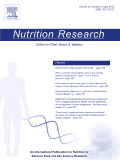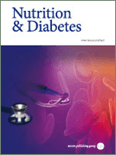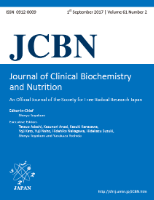
NUTRITIONAL NEUROSCIENCE
Scope & Guideline
Exploring the Brain's Diet: Where Nutrition Meets Neuroscience
Introduction
Aims and Scopes
- Diet and Mental Health:
Research often explores the relationship between dietary patterns, specific nutrients, and mental health outcomes, including depression, anxiety, and cognitive decline. - Nutritional Interventions in Neurological Disorders:
The journal publishes studies on how dietary interventions, such as supplementation with omega-3 fatty acids or probiotics, can affect outcomes in various neurological and psychiatric disorders. - Gut-Brain Axis:
A significant focus is placed on the gut-brain connection, investigating how gut microbiota and dietary components interact to influence brain health and behavior. - Mechanisms of Action:
Research often investigates the biochemical and molecular mechanisms through which dietary elements exert neuroprotective effects or contribute to neurodegenerative processes. - Animal and Human Studies:
The journal features both preclinical animal studies and clinical trials in humans, providing a comprehensive view of the impact of nutrition on neurological health.
Trending and Emerging
- Microbiome and Neurotransmission:
There is an increasing focus on how gut microbiota influence neurotransmitter systems and overall brain health, reflecting growing interest in the gut-brain axis. - Nutritional Psychiatry:
Emerging studies are investigating the role of nutrition in psychiatric disorders, particularly the impact of diet on mood, anxiety, and cognitive function. - Functional Foods and Neuroprotection:
Research is trending towards functional foods, such as polyphenol-rich diets and probiotics, that offer neuroprotective benefits and promote cognitive health. - Personalized Nutrition Approaches:
The emphasis is shifting towards personalized nutrition, tailoring dietary recommendations based on genetic, epigenetic, and microbiome profiles to optimize neurological outcomes. - Diet-Related Mechanisms of Neurodegeneration:
A growing body of research is exploring the specific mechanisms through which diet influences neurodegenerative diseases, including oxidative stress, inflammation, and metabolic pathways.
Declining or Waning
- Traditional Dietary Patterns:
There has been a noticeable decrease in studies focused solely on traditional dietary patterns like the Mediterranean diet without exploring their specific biochemical impacts or mechanisms. - Isolated Nutrient Studies:
Research that solely examines the effects of isolated nutrients (e.g., single vitamins or minerals) on neurological health is becoming less frequent, with a shift towards examining dietary patterns and their holistic effects. - Generalized Dietary Recommendations:
Publications providing broad dietary recommendations without specific clinical or experimental evidence are declining, as there is a greater emphasis on personalized nutrition and tailored dietary interventions.
Similar Journals

Eurasian Journal of Medicine
Connecting researchers to the pulse of Eurasian medicine.Eurasian Journal of Medicine, published by Atatürk University, stands as a vital resource in the field of medicine, particularly within the context of Eurasian healthcare advancements. Established as an Open Access journal since 1969, it is committed to distributing high-quality research widely, ensuring that vital findings are accessible to researchers, practitioners, and medical students alike. With an impact factor indicative of its relevance, the journal is currently ranked #251 out of 636 in the "General Medicine" category within Scopus, placing it in the 60th percentile and holding a Q3 quartile classification for 2023. Covering a diverse range of topics in medicine from 2012 to 2024, the journal publishes novel research, reviews, and clinical studies that contribute to the understanding and practice of medicine in transition. Located in Erzurum, Turkey, the Eurasian Journal of Medicine aspires to foster dialogue and innovation in the medical community worldwide.

NUTRITION AND CANCER-AN INTERNATIONAL JOURNAL
Elevating Standards in Cancer Nutrition ResearchNUTRITION AND CANCER - AN INTERNATIONAL JOURNAL, published by ROUTLEDGE JOURNALS, TAYLOR & FRANCIS LTD, stands as a vital resource in the interconnected realms of nutrition and oncology. Since its inception, this journal has been at the forefront of disseminating cutting-edge research and innovative findings related to the impact of nutrition on cancer prevention, treatment, and survivorship. With an impressive track record spanning from 1978 to 2024, this quarterly publication is categorized within the third and second quartiles across multiple fields, including Cancer Research and Nutrition and Dietetics, signifying its importance in these disciplines. Researchers and practitioners alike can benefit from its comprehensive studies, rigorous reviews, and insightful commentary, all aimed at fostering evidence-based practices for improving patient outcomes. Although not open access, the journal ensures wide dissemination of critical research findings, contributing to the global conversation on the role of dietary factors in cancer epidemiology. By exploring the latest advancements, NUTRITION AND CANCER invites a diverse audience of scholars, clinicians, and students to engage with the dynamic interplay between nutrition and cancer.

Nutrition and Dietary Supplements
Elevating Public Health through Nutritional ResearchNutrition and Dietary Supplements is a premier, peer-reviewed journal published by DOVE MEDICAL PRESS LTD, dedicated to the exploration of advances in nutritional science and the role of dietary supplements in health and disease management. Since its inception, the journal has maintained an Open Access model, enabling researchers, professionals, and students worldwide to access high-quality, cutting-edge research without barriers. With an emphasis on evidence-based findings, the journal encourages submissions that evaluate the efficacy, safety, and innovation within the field of nutrition, making a significant impact on public health and dietary guidelines. The journal's ISSN is 1179-1489 and its commitment to disseminating meaningful research positions it as a vital resource for those involved in nutrition science.

Journal of Nutrition Health & Aging
Empowering healthier aging with innovative research.Welcome to the Journal of Nutrition Health & Aging, a prestigious publication dedicated to advancing knowledge in the critical fields of nutrition, gerontology, and geriatrics. Published by Elsevier Science Inc, this journal boasts an impressive impact factor and is recognized in the top quartile (Q1) of multiple categories including Geriatrics and Gerontology, Medicine (miscellaneous), and Nutrition and Dietetics. Since its inception in 1997, it has served as a vital platform for researchers, practitioners, and students alike to disseminate innovative research and practical applications relevant to aging populations. With a Scopus rank placing it in the top 15% of its field, it underscores its commitment to high-quality and impactful scholarship. Although it is not an open access journal, its significant reach ensures that valuable insights will continue to inform best practices and policy decisions in health and nutrition. We invite you to explore and contribute to this vital conversation surrounding health and well-being in older adults.

Translational Neuroscience
Innovating the Future of Neurological Science.Translational Neuroscience, published by DE GRUYTER POLAND SP Z O O, is a leading open-access journal since its inception in 2015, dedicated to the multidisciplinary exploration of neurological research and its clinical applications. With an ISSN of 2081-3856 and an E-ISSN of 2081-6936, the journal serves as a crucial platform for scholars and practitioners to disseminate innovative findings and theoretical advancements in the field of neuroscience. Covering various aspects of general neuroscience, it is ranked in the Q3 quartile for 2023 and positioned at Rank #75 out of 113 in its category, reflecting its growing impact within the scientific community. The journal strives to bridge the gap between laboratory research and clinical practice, fostering collaboration among researchers, clinicians, and educators. The editorial team is committed to maintaining high publication standards that engage the audience with rigorous research while promoting a culture of open science. For those interested in the forefront of neuroscience research, Translational Neuroscience offers an invaluable resource for knowledge and innovation.

NUTRITION
Transforming health through groundbreaking nutrition studies.NUTRITION is a prestigious peer-reviewed journal published by Elsevier Science Inc, dedicated to advancing the field of dietary practices and metabolism. With an ISSN of 0899-9007 and an E-ISSN of 1873-1244, this journal has been serving the academic community since its inception in 1987, showcasing high-quality research and reviews through 2024. Recognized for its significant contributions to the fields of Endocrinology, Diabetes and Metabolism and Nutrition and Dietetics, NUTRITION holds a commendable Q2 category ranking in both areas, reflecting its impactful presence with a Scopus rank of #26 out of 140 and #51 out of 244 in its respective categories. The journal primarily aims to disseminate innovative research findings that illuminate the complex interplay between nutrition and health, fostering a deeper understanding among researchers, healthcare professionals, and students alike. By bridging scientific inquiry with practical application, NUTRITION plays a vital role in shaping public health policies and dietary recommendations worldwide.

Animal Nutrition
Leading Research in Animal Nutrition and Food ProductionAnimal Nutrition is a premier open-access journal dedicated to advancing the understanding of nutritional science in animals, published by KEAI PUBLISHING LTD. Established in 2015, this journal has quickly risen to prominence within its field, securing a Q1 ranking in both Animal Science and Zoology and Food Animals as of 2023. With an impressive Scopus ranking, positioned first among 39 journals in Veterinary Food Animals and tenth among 490 in Agricultural and Biological Sciences - Animal Science and Zoology, it remains a critical resource for researchers, professionals, and students alike. The journal's commitment to open access ensures that cutting-edge research is readily available to a global audience, fostering the dissemination of knowledge that drives innovation in animal nutrition and health. With a focus on the intersection of animal physiology, dietary interventions, and food production systems, Animal Nutrition plays a pivotal role in shaping sustainable practices and improving animal welfare worldwide.

NUTRITION RESEARCH
Advancing the Science of Nutrition for Better HealthNUTRITION RESEARCH, published by PERGAMON-ELSEVIER SCIENCE LTD, stands as a pivotal platform for the dissemination of groundbreaking research in the fields of nutrition, dietetics, and endocrinology. With an established track record since 1981, the journal has successfully converged its academic purview into 2024, providing a continuous source of high-impact studies that address critical issues in human health and nutrition. Recognized as a Q2 journal in multiple relevant categories, including Endocrinology and Nutrition, as well as boasting respectable Scopus rankings, it serves a diverse audience of researchers, professionals, and students eager to enhance their understanding of nutritional science. Although the journal does not operate on an open access model, its contributions are invaluable, fostering advancements and collaboration within the scientific community dedicated to improving dietary practices and outcomes. The current address of the journal is THE BOULEVARD, LANGFORD LANE, KIDLINGTON, OXFORD OX5 1GB, ENGLAND, positioning it at the heart of global research initiatives.

Nutrition & Diabetes
Innovating Solutions for Metabolic DisordersNutrition & Diabetes is a leading open-access journal published by SPRINGERNATURE that has been at the forefront of research since its inception in 2011. With a dedicated focus on the intricate relationship between nutrition and metabolic disorders, this journal serves as an essential resource for researchers, healthcare professionals, and students committed to advancing knowledge in the fields of endocrinology, diabetes, and internal medicine. The journal is recognized for its high impact, reflected in its prestigious Q1 ranking in both Endocrinology, Diabetes and Metabolism and Internal Medicine, as well as its strong performance in Scopus rankings, placing it within the top echelons of related disciplines. Based in the United Kingdom, Nutrition & Diabetes is committed to publishing high-quality, peer-reviewed research that addresses current challenges and innovations in nutrition science and metabolic health. Open Access since 2011, the journal promotes the dissemination of critical findings, ensuring that vital research is accessible to a global audience, thus driving further advancements in this important and evolving field.

JOURNAL OF CLINICAL BIOCHEMISTRY AND NUTRITION
Innovating Insights in Clinical BiochemistryJOURNAL OF CLINICAL BIOCHEMISTRY AND NUTRITION is a premier publication dedicated to the advancements in the fields of clinical biochemistry, nutrition, and dietary sciences. Published by the esteemed JOURNAL CLINICAL BIOCHEMISTRY & NUTRITION in Japan, this journal serves as a crucial platform for researchers and professionals to disseminate their findings and insights. With an ISSN of 0912-0009 and an E-ISSN of 1880-5086, it features a broad spectrum of original research articles, reviews, and case studies, fostering a deeper understanding of the interplay between biochemical processes and nutritional science. Notably, the journal has achieved significant rankings, placed in the Q3 and Q2 quartiles across various relevant categories, indicating its rising impact and relevance within the scientific community. Researchers will benefit from its rich repository of knowledge, while students and professionals will find it an invaluable resource for staying updated with the latest developments. Access options are available for interested readers, further contributing to the journal's objective of promoting open dialogue and research in clinical biochemistry and nutrition.